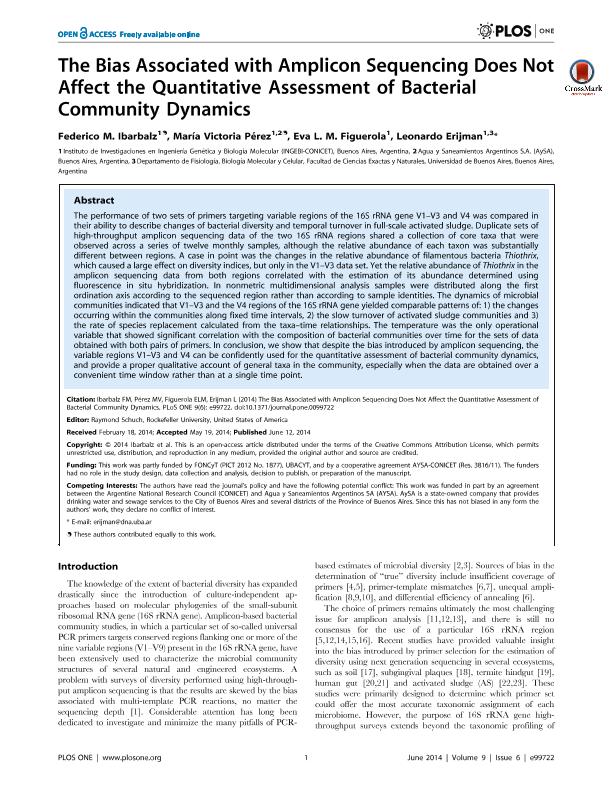Artículo
The Bias Associated with Amplicon Sequencing Does Not Affect the Quantitative Assessment of Bacterial Community Dynamics
Ibarbalz, Federico Matias ; Perez, María Victoria; Figuerola, Eva Lucia Margarita
; Perez, María Victoria; Figuerola, Eva Lucia Margarita ; Erijman, Leonardo
; Erijman, Leonardo
 ; Perez, María Victoria; Figuerola, Eva Lucia Margarita
; Perez, María Victoria; Figuerola, Eva Lucia Margarita ; Erijman, Leonardo
; Erijman, Leonardo
Fecha de publicación:
06/2014
Editorial:
Public Library of Science
Revista:
Plos One
ISSN:
1932-6203
Idioma:
Inglés
Tipo de recurso:
Artículo publicado
Clasificación temática:
Resumen
The performance of two sets of primers targeting variable regions of the 16S rRNA gene V1-V3 and V4 was compared in their ability to describe changes of bacterial diversity and temporal turnover in full-scale activated sludge. Duplicate sets of high-throughput amplicon sequencing data of the two 16S rRNA regions shared a collection of core taxa that were observed across a series of twelve monthly samples, although the relative abundance of each taxon was substantially different between regions. A case in point was the changes in the relative abundance of filamentous bacteria Thiothrix, which caused a large effect on diversity indices, but only in the V1-V3 data set. Yet the relative abundance of Thiothrix in the amplicon sequencing data from both regions correlated with the estimation of its abundance determined using fluorescence in situ hybridization. In nonmetric multidimensional analysis samples were distributed along the first ordination axis according to the sequenced region rather than according to sample identities. The dynamics of microbial communities indicated that V1-V3 and the V4 regions of the 16S rRNA gene yielded comparable patterns of: 1) the changes occurring within the communities along fixed time intervals, 2) the slow turnover of activated sludge communities and 3) the rate of species replacement calculated from the taxa-time relationships. The temperature was the only operational variable that showed significant correlation with the composition of bacterial communities over time for the sets of data obtained with both pairs of primers. In conclusion, we show that despite the bias introduced by amplicon sequencing, the variable regions V1-V3 and V4 can be confidently used for the quantitative assessment of bacterial community dynamics, and provide a proper qualitative account of general taxa in the community, especially when the data are obtained over a convenient time window rather than at a single time point.
Archivos asociados
Licencia
Identificadores
Colecciones
Articulos(INGEBI)
Articulos de INST.DE INVEST.EN ING.GENETICA Y BIOL.MOLECULAR "DR. HECTOR N TORRES"
Articulos de INST.DE INVEST.EN ING.GENETICA Y BIOL.MOLECULAR "DR. HECTOR N TORRES"
Citación
Ibarbalz, Federico Matias; Perez, María Victoria; Figuerola, Eva Lucia Margarita; Erijman, Leonardo; The Bias Associated with Amplicon Sequencing Does Not Affect the Quantitative Assessment of Bacterial Community Dynamics; Public Library of Science; Plos One; 9; 6; 6-2014; 1-12; e99722
Compartir
Altmétricas



